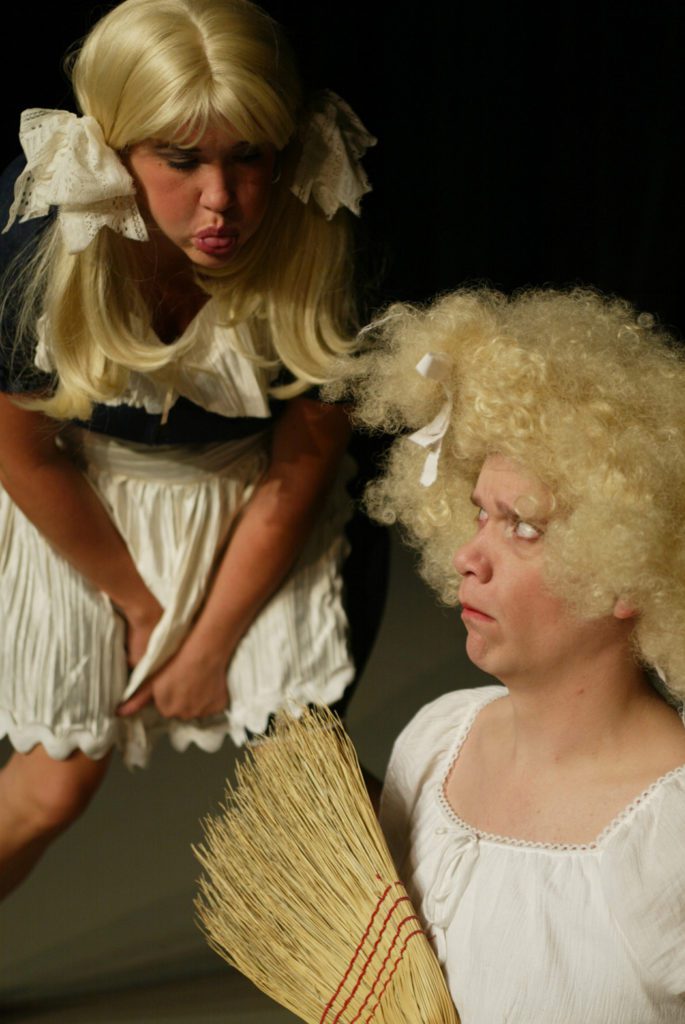In Elevator, the first of Buntport Theater’s two original one-acts presented under the title Misc. , three people stand in an elevator, pretty much unmoving. We’re treated to several silent minutes, during which we study the actors’ expressions. A fourth person gets into the elevator, then gets off. There’s a blackout. Then the exact same scene is replayed, except this time you can hear the characters’ thoughts. The tall, skinny guy (Erik Edborg), who seems so convinced he’s fat that he has somehow persuaded the other characters of that fact, is a hugely talented and successful author who’s completely at a loss about how to begin his next book. He’s on the way to pitch this shaky project to his new editor. Unbeknownst to him, the new editor (Erin Rollman) is standing right beside him. She’s a smartly dressed woman clasping her briefcase in front of her, and she’s alternating between exultation at being handed so eminent an author and the conviction that she herself is an imposter. The third rider (Evan Weissman) is on his way to the top floor to commit suicide. As for the fourth insouciant player (Hannah Duggan), you’ll have to find out her motivations for yourself.
The dialogue begins with musings — some of them very funny — about butter, umbrellas and untucked shirts, but it becomes deeper and more complex as the piece progresses. People’s thoughts and words overlap. Sometimes the characters seem to hear each other. At least once, they clearly do. But each rider’s individual solitude is never entirely broken.
Something serious is being explored here, although with a light touch. We’re reminded that an elevator is an essentially liminal, almost timeless space. Ideas about time, language and memory surface again and again. The characters ponder the power of narrative and the way all of us create a coherent life story for ourselves. The editor remembers having once kissed the Blarney Stone in Ireland and wonders if she’s too facile with words. Foreshadowing the ubiquitous dualism of the second play of the evening, <Cinderella, she wonders if it wouldn’t have been better to kiss the back of the stone instead and lose her verbosity.
Elevator is pleasant and amusing, but it needs some trimming and tightening.
The second piece bubbles with cheerful invention as the same four actors play out the story of Cinderella, using movement, nonsense syllables, props, masks, many kinds of music and semi coherent sentences that seem to have been distorted by helium. Erik Edborg is a wistful Cinderella who consoles himself in his solitude by making a puppet of his left hand and having it serenade him. Erin Rollman plays both the good mother and the wicked stepmother; for the latter, she simply turns, revealing a mask on the back of her head. Of course this requires moving, even dancing, backward for the rest of the evening, and the result is scuttling and grotesque and hilariously funny. Duggan, also appropriately bifurcated, plays both ugly sisters. And, red-lipped and wearing a platinum wig, Weissman serves as the impresario, uttering frantic nonsense syllables as he tries to make himself understood.
Masks, puppets and doubles abound as Edborg morphs into a plastic doll and back into Cinderella again and Weissman dutifully puffs out his pants to impersonate the prince. The only character who remains resolutely herself throughout is the Fairy Godmother, played as a helmet-haired teenager by a silently exasperated Rollman.
Buntport is made up of several onetime students from Colorado College who studied Eastern European theater together. (Surely no one who hadn’t would come up with the pronunciation “pranshay” for “prince.”) These folks can do astonishing things with objects, and their inventiveness is amazing. They push boundaries and sometimes touch on the profound, but it’s all done with lightness and a fizzing good humor.
-Juliet Wittman, October 2, 2003, Westword
